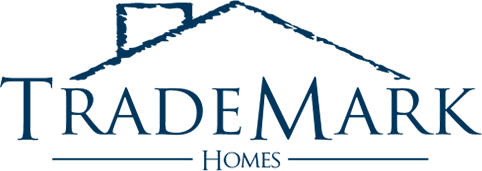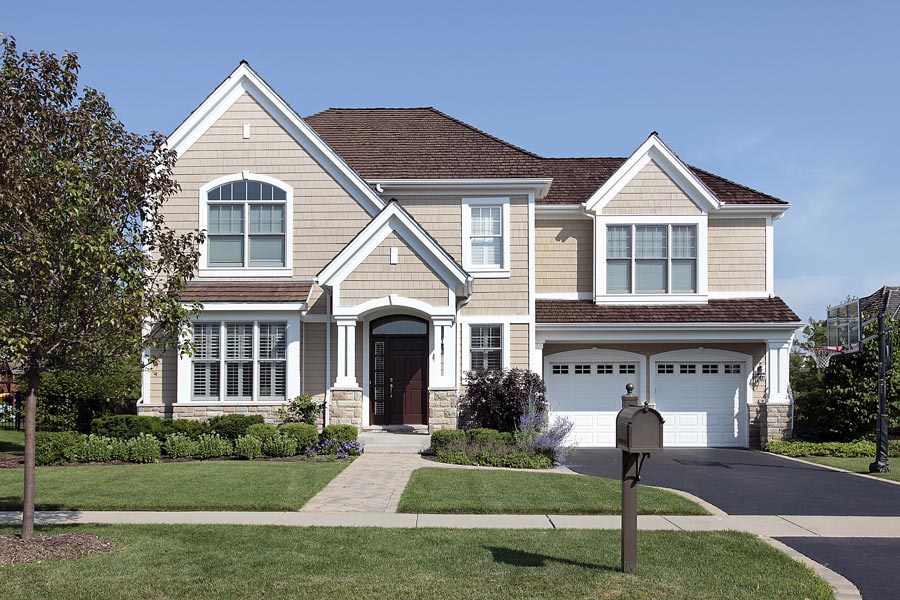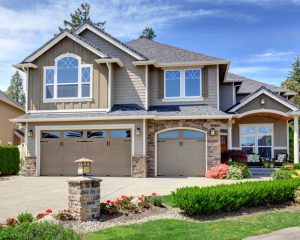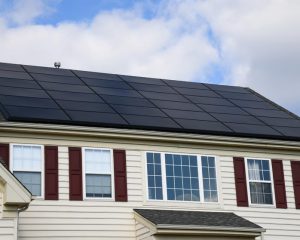Building a custom home is a lifelong dream for millions of homeowners, but the cost of construction can be a huge deterrent. However, with the right financing, it is possible to get started building your dream home—it just takes a little patience and understanding. Since financing the construction of a new home is a bit different than taking out a mortgage, we’ve created a comprehensive guide to help. Below, you’ll find everything you need to know on how to finance your new home.
3 Primary Types of Loans to Fund Your New Home Build
As mentioned, financing your new home construction isn’t the same as purchasing an existing home or structure. In the former, you need to cover the costs of the land or lot, construction, and, eventually, the home itself. In the latter, it’s more straightforward as you only require a mortgage. Luckily, we’ll discuss all three types of financing necessary when building your new custom home.
Lot/Land Loans
Unless you already own land, you’ll need to acquire a loan to pay for the property itself. The price of your lot or piece of land will depend on the location, its size, and the overall value of the land at the time of an inspection. This may change based on elevation, shrubbery, or the overall level of work that’s needed to be done before construction can begin. Typically speaking, plots of land that are closer to a municipal center tend to be increasingly more expensive. Of course, you can bypass a lot or land loan by paying in cash, but that’s not always an option.
You can obtain a lot or land loan from a variety of types of financial institutions, but the interest rates will vary based on individual factors and characteristics determined by the lender. In most instances, the lot or land loan can range from two to twenty years. Rates can either be fixed or floating depending on the lender, and a larger down payment is usually preferred for this type of financing.
Before choosing your lot, it’s important to take various factors into consideration. The most important are the proximity to a town, the educational system, laws on the local land use or zoning, and its potential value in the future.
Construction Loans
Next, you’ll need to obtain a construction loan. This covers the process of building itself. All-in-all, construction loans are available to cover the cost of land, plans, permits, labor, associated building fees or costs, materials, closing costs, contingency reserves, and interest reserves.
Construction loans tend to release periodic payments to help cover the changing phases of development over time. However, they may not be offered by every financial institution or bank, so it’s important to do your research to find an option that works for you. Construction loans tend to be on the shorter side, oftentimes ranging from about 12 to 18 months, depending on the project. They still require about 20% for a down payment. Due to their short nature, interest rates tend to be higher than those associated with mortgages. There are three primary types of construction loans to choose from—construction-only loans, construction-to-permanent loans, and renovation construction loans.
Construction-Only Loans
A construction-only loan is just as it sounds—it only covers the cost of the construction itself. This is a short-term loan that follows the guidelines we discussed above. Once the development of your custom home is completed, the construction-only loan must be paid off, and new financing for the mortgage needs to be acquired.
Construction-to-Permanent (C2P) Loans
A construction-to-permanent loan, also commonly referred to as a single-close loan or a one-step loan, will automatically switch from a construction loan to a mortgage loan once the building has been completed. This is beneficial for those who don’t want to deal with three separate financing options, all of which require their own application process. However, the payments can sometimes be higher than a traditional mortgage, and there usually needs to be refinancing between the two phases of development. Typically speaking, a minimum credit score of 700 is necessary for a construction-to-permanent loan.
Renovation Construction Loans
If you’re building a new home from scratch, this category doesn’t apply. However, homeowners that want to undergo renovations can apply for a renovation construction loan. This is financing available to cover the costs of major renovations or if you’ve purchased a fixer-upper home and need to make some upgrades before moving in.
Mortgage-Based Loans
Once your custom home build is completed, you’ll need a mortgage to continue paying for the completed home. If you have a construction-to-permanent loan, you won’t need to do anything else. Otherwise, you’ll need to start the process for your mortgage with a lender. This is the same type of loan that you need to buy an already constructed home, and the process is identical. As with all loans, the interest rates vary based on the value of your home after construction, the location, and your financial standings. Individuals with higher credit scores and more credit history tend to receive lower interest rates and more favorable lending conditions.
Typically speaking, you’ll need a separate loan for each of the processes of building a custom home. However, there are instances where this can be different. In order to better understand your financing options, partner with a reputable custom home builder. In some situations, they may be able to provide builder or developer-sponsored financing.
Builder or Developer Sponsored Financing
Some custom home builders offer their own in-house financing options. This is to help make the home-building process easier and less stressful. This type of financing aims to help homebuyers from sales and design to financing and closing. They’re considered to be legitimate financing lenders that can help provide individuals with a more “one-stop shop” type of loan.
Just make sure that you fully understand the parameters of builder-sponsored financing and always choose a reputable company to work with. This can help you reduce the risk of conflicts of interest while still maintaining all of the benefits, such as price breaks, free upgrades, or reimbursed closing costs. Utilizing this type of financing can also expedite the entire process, as you won’t need to undergo various types of loan applications and processing times.
Getting Ready for Financing
Once you’ve got a better understanding of how to finance your new home, it’s time to get ready for the process. The more prepared you are, the easier it will all go. To help, consider the following tips.
Access Your Credit Information
It’s important to understand what your credit score is before you start the home-building process. Simply request a free credit report so you can see your standings and learn about any areas that need improvement.
Consider the Budget
Just because you’re financing your new home-build doesn’t mean you’ll have an unlimited budget. Consider what’s realistic for you based on your income and assets before you begin the homebuilding process. This will help you with loan applications and planning for your custom home build.
Save for a Down Payment
If you haven’t done so already, now is the time to put together the money you’ll need for your down payment. If you’re going to be applying for multiple types of finance, you may need more than one. Make sure you know what to expect ahead of time and have sufficient funds to cover these costs.
Gather the Right Documentation
After you determine who your preferred lender will be for each step of the home-building process, it’s important to take the time to prepare the necessary documentation. This will include things such as:
- Proof of identity
- Proof of income
- Recent pay stubs
- Bank statements
- Tax returns
- Asset declaration
- Brokerage account details
- A list of debts
- The source of the down payment
- Liabilities
- Current mortgage or rent payments
- Profit-loss statements (for self-employed)
If you’re still stuck with how to finance your new home, turn to the professionals at TradeMark Homes. At TradeMark Homes, we make the process of becoming a custom homeowner enjoyable and stress-free. Our team works with you from planning through every step of the construction process to ensure you get the home you want with exceptional craftsmanship.
TradeMark Homes also offers builder-sponsored financing options, so you don’t have to sacrifice any features in your new home. Our flexible home financing options mean you can move into your beautiful home on your terms, not those set by commercial banks or loan sharks. Plus, you won’t have to deal with juggling multiple types of loan applications and processing times. However, we understand that the first step in building your new home begins with you. Fill out an inquiry form or call us today at 479-267-9900 to schedule a consultation, discuss your vision, and go over your budget.



